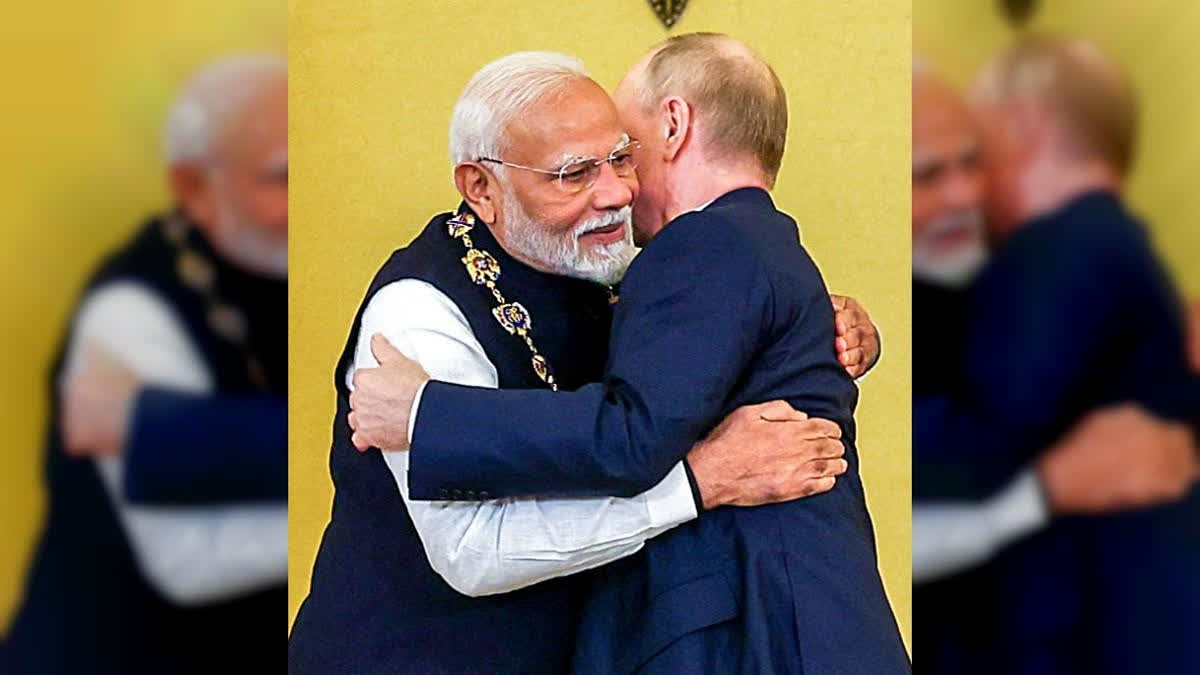India-Russia relations are on the brink of stress from the emerging global geopolitical dynamics. While India and Russia keep up cordial relations, their geopolitical priorities have evolved due to the Beijing-Moscow affiliation particularly deepening by the US-Russia tensions since the Ukraine crisis; India-China border clashes; the growing confrontation between US-China and the growing US-India ties.
Russia is jamming between its obligation to the "no limits" partnership with China and its simultaneous intent to protect its influence in India that it had built up over six decades with New Delhi. There is doubt that in the future Russia’s dependence on China may be growing into a full military alliance, which would set hurdles to India–Russia relations.
Moreover, strategic experts believe that in the event of more border clashes or a full-scale war in the future between India and China, it would be a complicated challenge for Moscow to sustain a partnership with New Delhi. At the backdrop of this hot-tempered global scenario Prime Minister Narendra Modi’s two-day visit to Russia sends a clear signal that both New Delhi and Moscow will maintain the continued strengthening and deepening of the "Special and Privileged Strategic Partnership.”
The 22nd India-Russia Annual Summit, a high-profile meeting which gave a wide geo-political impact reviewed all aspects of bilateral ties and explored opportunities to further boost cooperation in sectors like trade, defence, energy, transport and connectivity, trade and investment and cooperation in the United Nations (UN) and multilateral fora.
Today, around 60 to 70 per cent of its existing air, land, and naval systems of Russian-origin weapons and equipment depend on Russia for spare parts and production. Among the most important of these systems are Russian-manufactured T-90 tanks, MiG-29-K and Su-30-MKI aircraft, Kalashnikov Ak-203 rifles, 'Igla-S Very Short Range Air Defence Systems' (VSHORAD), Konkurs antitank guided missile, maintenance facilities for India's MiG-29 fighter jets and the jointly produced BrahMos missile.
For instance, the Indian Army still relies profoundly on 97 per cent of its 3,740 Russian-made tanks. On 7/7/24, Rostec, the Russian company signed an agreement to manufacture advanced armour-piercing "Mango" tank shells in India for the T-90 tank. Following Modi-Putin talks at the Russia-India summit, these collaborations will gain momentum and Moscow will deal with spare parts supply issues through joint ventures under Make-in-India through a transfer of technology by a Working Group on Technological Cooperation and discussing its provisions during the next meeting of the India-Russia Intergovernmental Commission - the Military & Military-Technical Cooperation (IRIGC-M&MTC).
New Delhi and Moscow reiterated the importance of robust and wide-ranging cooperation in the energy sector as a significant pillar of the "Special and Privileged Strategic Partnership." New Delhi has benefited from purchases of Russian oil at steep discounts after the US and its allies imposed sanctions on Russian crude.
Indian imports of Russian crude rose from $2.5 billion in 2021 to $46.5 billion in 2023 after the Ukraine war. The summit noted the noteworthy growth of bilateral trade in 2023 which is around double of the bilateral trade target of USD 30 billion set for 2025. For further growth in bilateral trade, Modi and Putin agreed to set a bilateral trade target of USD 100 billion by 2030. As well, both agreed to continue working together to promote a bilateral settlement system using national currencies.
To increase the capacity of infrastructure, Modi and Putin are keen to expand transport and connectivity like the Chennai-Vladivostok (Eastern Maritime) Corridor and the International North-South Transport Corridor (INSTC), as well as developing shipping between Russia and India via the Northern Sea Route. They want to launch a joint working group within the IRIGC-TEC for cooperation on the Northern Sea Route. This will boost hydrocarbon ties between Russia and India. In the last week of June, Russia for the first time sent two trains loaded with coal to India through the INSTC, which connects Russia to India via Iran.
Both New Deli and Moscow decided to intensify trade and investment cooperation in the Far East and the Arctic zone of Russia. In respect of this, they are mapping to sign a programme of India-Russia cooperation in trade, economic and investment spheres in the Russian Far East for the period from 2024 -2029, as well as of cooperation principles in the Arctic zone of Russia to provide the necessary framework for further cooperation between them, especially in the sectors of agriculture, energy, mining, manpower, diamonds, pharmaceuticals, maritime transport, etc.
The raison d'être for the emergence of a multi-polar international system for New Delhi and Moscow endowed to continue to share a common strategic rationale for their affiliation through various multilateral forums like UN, BRICS, G20, East Asia Summit and Shanghai Cooperation Organization (SCO) to cooperate and collaborate on issues of mutual concern like climate change, cyber security, drug trafficking, cross-border organised crimes, separatism and counterterrorism.
In addition to this, both leaders underlined the importance of strengthening cooperation within various regional platforms, like the ASEAN Regional Forum on Security (ARF), and the ASEAN Defence Ministers Meeting Plus (ADMM-Plus). Russia renewed and reaffirmed its unwavering support for India’s permanent membership of the UN Security Council.
Both leaders also highlighted the importance of cooperation in science and technology, civil nuclear cooperation, cooperation in Space and also security dialogue at the level of national security advisors and the national security councils on bilateral, regional and global issues of mutual concern.
Despite the "no limits" friendship between Putin and Xi Jinping, Putin has kept a certain distance from Beijing and specified bonhomie with Modi through his bear hug and awarding of the highest civilian award. Russian analysts believe that Putin’s visit to North Korea was not received properly in Beijing, and now this balance with India confirms Moscow is not completely submissive to Beijing.
Moreover, both Moscow and Beijing have their own interests in the Arctic, Central and Northeast Asia. In the case of New Delhi, it must uphold its relations with Russia to handle in a manner that Russia not to excessively dependent upon its adversary, China. In Indian foreign policy, Moscow seems to be part of a wider balancing act between East and West.
Pankaj Saran, a former Indian ambassador to Russia and deputy national security adviser believes that India’s congeniality with Russia could prove useful as a prospective interlocutor between Moscow and the West. Also, Dimitry Trenin, director of the Carnegie Moscow Centre believes that close relations with New Delhi are useful for Moscow in dealing practically on Eurasian and Indo-Pacific issues with the US and Japan, which are linked with India through the QUAD.
Despite the end of the Cold War and U.S.-India cooperation reaching its highest level in recent years, Russia has remained a critical partner and remains an important supplier of weapons and, most recently, discounted oil. To make obvious to Moscow that India was not ready to isolate Putin by joining the Western camp, Modi breached the tradition of prime ministers visiting South Asian neighbours first after an election. Moreover, the strongest friendship and warmth between India and Russia will be useful in future to take part in a dialogue or conversation in a crisis situation between the West and Russia.
(Disclaimer: The opinions expressed in this article are those of the writer. The facts and opinions expressed here do not reflect the views of ETV Bharat)



